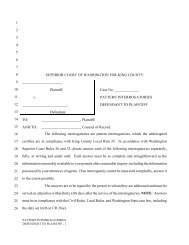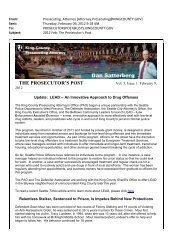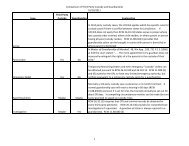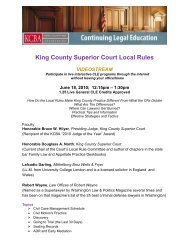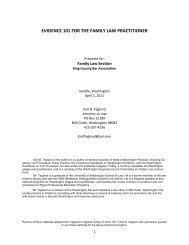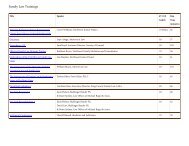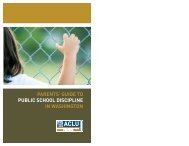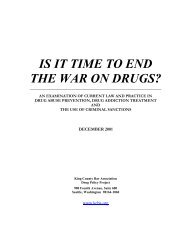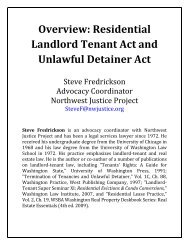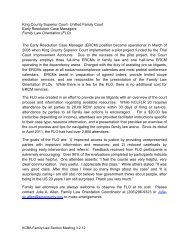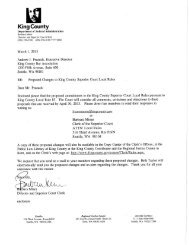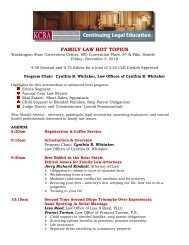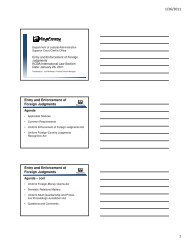Effective Drug Control: Toward A New Legal Framework
Effective Drug Control: Toward A New Legal Framework
Effective Drug Control: Toward A New Legal Framework
Create successful ePaper yourself
Turn your PDF publications into a flip-book with our unique Google optimized e-Paper software.
function of the body of man or other animals; and (D) articles intended for use as<br />
a component of any article specified in clause (A), (B), or (C). 379<br />
The Act authorizes the Secretary of Health and Human Services to promulgate<br />
regulations 380 and conduct examinations and investigations, 381 and establishes the Food<br />
and <strong>Drug</strong> Administration (FDA) within the Department of Health and Human Services. 382<br />
The Secretary is authorized to cooperate with “associations and scientific societies” in the<br />
revision of the U.S. Pharmacopoeia necessary to carry out the work of the Food and <strong>Drug</strong><br />
Administration. 383<br />
Federal Agencies<br />
The Office of National <strong>Drug</strong> <strong>Control</strong> Policy (ONDCP) 384 and the <strong>Drug</strong><br />
Enforcement Administration (DEA) 385 are both authorized under Title 21 of the U.S.<br />
Code. The ONDCP, part of the Executive Office of the President, was established by the<br />
Anti-<strong>Drug</strong> Abuse Act of 1988. The purpose of the agency is to establish policies,<br />
priorities and objectives for drug control in the nation. Its stated goals are “to reduce<br />
illicit drug use, manufacturing, and trafficking, drug-related crime and violence, and<br />
drug-related health consequences.” The agency releases an annual National <strong>Drug</strong> <strong>Control</strong><br />
Strategy that establishes a program, budget and guidelines for anti-drug efforts at the<br />
national, state and local levels. 386<br />
The DEA is an arm of the U.S. Department of Justice. Its mission is:<br />
to enforce the controlled substances laws and regulations of the United States<br />
and bring to the criminal and civil justice system of the United States, or any<br />
other competent jurisdiction, those organizations and principal members of<br />
organizations, involved in the growing, manufacture, or distribution of<br />
controlled substances appearing in or destined for illicit traffic in the United<br />
States; and to recommend and support non-enforcement programs aimed at<br />
reducing the availability of illicit controlled substances on the domestic and<br />
international markets. 387<br />
Alcohol Exemption under the 21 st Amendment<br />
The 21 st Amendment to the U.S. Constitution repealed the 18 th Amendment, a<br />
national prohibition on the sale of alcohol. Section 2 of the 21 st Amendment has been<br />
interpreted to give the individual states the right to make their own laws governing the<br />
manufacture, distribution and sale of alcohol within their borders. 388 The federal<br />
government does regulate the importation and interstate transportation of intoxicating<br />
liquors under the Federal Alcohol Administration Act of 1935, and it has the sole power<br />
to regulate liquor sales in the District of Columbia, on government owned military<br />
reservations and on tribal reservations. 389<br />
A pending decision from the U.S. Supreme Court in 2005 could redefine the reach<br />
of federal commerce power against the 21 st Amendment, with internet-based winemakers<br />
seeking direct shipments nationwide arguing that the states’ regulation of alcohol is an<br />
impediment to interstate commerce. 390



